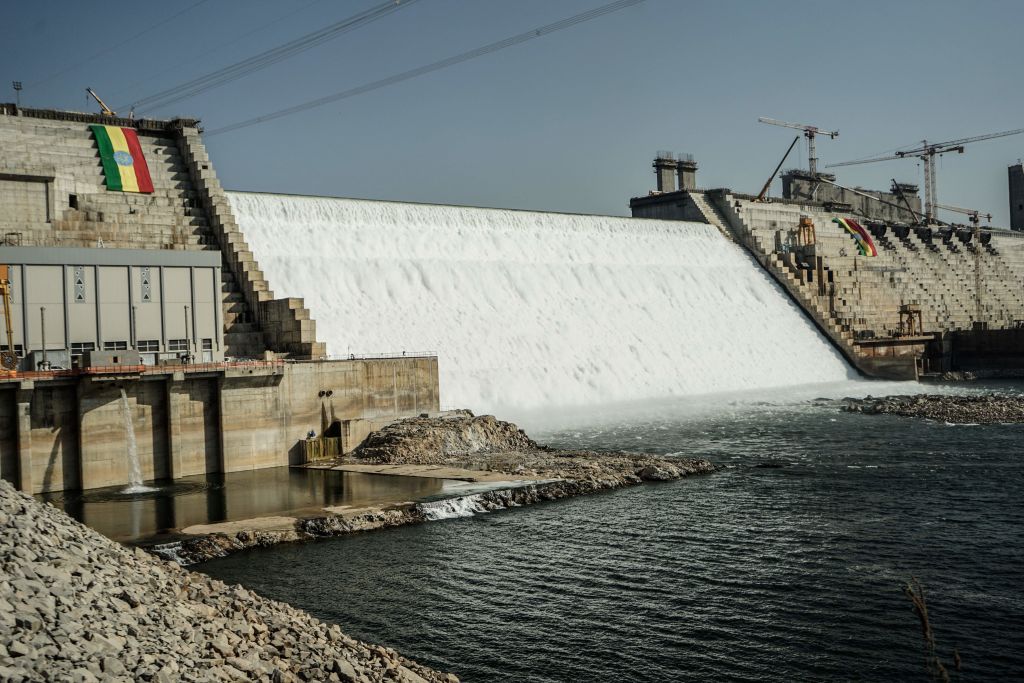ADF STAFF
The Grand Ethiopian Renaissance Dam has stoked tensions among Egypt, Ethiopia, and Sudan for more than a decade as the downstream countries fear the $4.2 billion megaproject will disrupt their water supply.
Those concerns increased in 2020 when Ethiopia decided to begin filling the dam’s massive reservoir on the Blue Nile, which provides 85% of the Nile’s volume as it flows through Sudan and Egypt.
A study by researchers at the University of Manchester suggests that the dam can provide electricity for Ethiopia, flood control for Sudan and drought protection for Egypt — but only if the countries work together.
“It’s all about compromise,” the study’s authors recently told the journal Nature. “Our goal is to show that any step towards adaptive cooperation results in benefits,” they wrote in research published in the journal Nature Climate Change.
Ethiopia is building the dam, known by its acronym GERD, to generate enough electricity to supply power to about 70% of its 110 million citizens. Even with electricity demand growing by 30% a year, the dam’s 6,500 megawatts would be more than enough for Ethiopia’s needs. Additional power could be sold to neighboring countries.
Sudan said in 2021 it was willing to buy 1,000 megawatts of power from the dam, about five times the amount of power Sudan already buys from Ethiopia.
By regulating most of the Nile’s flow, the dam also could prevent seasonal flooding, such as the floods that struck Khartoum and other parts of Sudan in August 2022.
Egypt, which uses the Nile for 97% of its water needs, sees the dam as a threat to the freshwater supply for its citizens and agriculture industry.
Egypt also sees the dam as a potential weapon: If Nile countries find themselves in conflict, Ethiopia could restrict the flow of the river as a tool of war, according to Alex De Waal, executive director of the World Peace Foundation.
When complete, the dam will hold an estimated 74 billion cubic meters of water. Researchers say Egypt can benefit from the dam’s massive stores of water in times of drought, as shifting weather patterns affect rainfall across the region.
“In principle, technically speaking, the dam is a win-win situation,” De Waal told Al-Jazeera.
Reaching that point, however, requires each country to consider the needs of the others.
“The formulation is based on cooperative behavior whereby the riparian countries consider each other’s interests through adaptive measures,” the researchers wrote.
Letting a single country maximize the benefits of the Nile harms its neighbors, the researchers wrote. However, if each country is willing to sacrifice a little for the needs of the others, the entire 11-country Nile basin — including the eight countries of the White Nile — could benefit, they added.
So far, the three countries most directly affected by the GERD project show few signs that they are willing to compromise.
“The domestic politics in each of these countries is founded on mistrust, founded on winner textual politics and conflict dominance. They have to talk. It’s necessary,” Adam Kassie Abebe, program officer with the International Institute for Democracy and Electoral Assistance, told Al-Jazeera.
The talks that Egypt, Ethiopia and Sudan have conducted in recent years have failed to produce any agreement over how best to manage the dam. Ethiopia has continued to fill the reservoir in the face of resistance from the downstream countries.
The third filling ended in August 2022 when Ethiopia announced that the dam was 88% complete. At the same time, the dam began to generate power.
Dam advocates say that because the water flows through the dam to make electricity, it poses no risk to countries downstream. In the long run, the project could strengthen ties among the countries that rely on the Nile, according to researchers.
“An incremental approach can help build trust between riparian countries,” the study’s authors wrote saying it could lead to benefit-sharing across the region.

